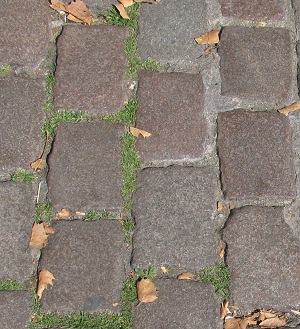
In this prequel to a bar, restaurant and hotel review, the author encounters an Italian, three Kazakhstanis and an impatient French woman on the route to Shangri-La is paved with good intentions.
* * *
I was headed to meet my friend L. at the Shangri-La, a high-luxury hotel that had recently opened in Paris. I had an appointment to interview the head bartender and a reservation at one of the hotel’s restaurants L. is my favorite research partner. She loves being treated like a princess, and like a princess she’s quick to point out flaw and enchantment.
When all goes well I’m on time. When all goes well for L. she’s 10 minutes late. So even though I was going to arrive at the Shangri-La Hotel a bit past our planned 8:15 p.m. rendez-vous, I had a small window of lateness when I left my apartment across the city at 7:45.
Before I’d gone a hundred yards I found a wallet on the cobblestones along the canal.
I picked it up. I looked around to see if anyone noticed. There were people outside a bar across the street but no one seemed to be paying attention.
Various studies, not highly scientific, have been performed in which wallets containing some money and contact information and photographs were intentionally strewn through a city or in a public space such as a bus station in order to find out how many wallets will be turned in or returned to the owner and with what contents.
I don’t recall the conclusion of those studies, but I didn’t like the thought of being watched for someone’s experiment as I tried to decide what to do with the wallet.
It was a thin brown leather wallet. There wasn’t much inside: a few plastic and paper cards, several receipts, 50€.
I looked at the receipts. The first was from La Madonnina, an Italian pasta restaurant on rue Marie et Louise, one street over. The receipt was dated the previous day shortly after 9 o’clock, 21:01:17 to be exact. The man, I assumed he was a man because he’d dined alone, had eaten a burrata con pomodorini, a glass of wine and a paccheri con pomorini for a total of 23.50€. My friend Henri once got sick after eating a pasta with seafood dish at La Madonnina—it was a silly thing to order in such a restaurant in the first place—but I’ve had several palatable pasta dishes there.
I thought of taking the wallet to the restaurant. But what would they do with it? That’s what they would likely say to me.
A second receipt in the wallet had today’s date and the time 19:32:34, so about 15 minutes ago. It came from the McDonald’s a few hundred yards from where I stood. The man had apparently dropped his wallet coming from McDonald’s and walking north along the canal, perhaps with a bag containing 1 Mx ch. Mythic Bac, 1 Nugget 6 and 1 frite Maxi Best of, as indicated on the receipt, totaling 11€35.
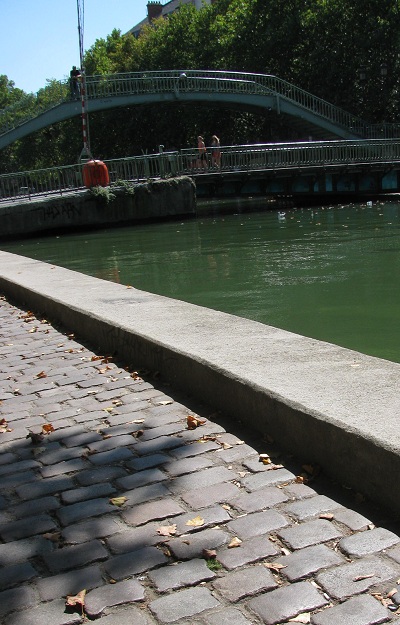 I looked around for someone eating from a McDonald’s bag on the edge of the canal. No one fit that description. Perhaps he had lost the wallet while eating fries out of the bag as he walked north along the canal.
I looked around for someone eating from a McDonald’s bag on the edge of the canal. No one fit that description. Perhaps he had lost the wallet while eating fries out of the bag as he walked north along the canal.
The man was Italian. Not that Italians alone in Paris necessarily eat pasta one evening then McDonald’s the next, though I suppose many do, but because there were two credit cards from Italian banks and a business card from a government ministry, all in the name of Italians. I say Italians, plural, because the credit cards had two different names on them, though one of the plastic cards and the business card had the same name, so I figured that to be his real name. On a dog-eared piece of paper bearing the name of one of the banks, the one with his “real” name, there was a message that I figured, without knowing Italian, to mean that in case this was found a certain phone number in Italy should be called.
I studied the contents of the wallet for a few minutes. I looked around for someone who might be in search of a wallet and/or who would be carrying a bag from McDonald’s. I didn’t know what to do with the wallet, but I knew that I didn’t want to spend the evening at the police station turning in a found wallet.
So I walked slowly across the bridge with the wallet in my hands, looking back to see if someone had his nose down on the paving stones along the canal looking for a lost article. Once I was out of sight from where I originally found the wallet I put it in my front pants pocket and walked on quickly to the metro.
I once lost my passport the day before an international flight. It must have fallen out of the folder I was carrying when I’d gone to make a photocopy, and by the time I got home I had a message from someone telling me that he’d found it. When I asked how he found my phone number he said that he’d called information, which surprised me because I’d thought that my number was unlisted. Apparently it wasn’t. He gave me his address and I went to pick it up immediately. I brought along a nice bottle of wine as a thank you gift.
My hero opened the door and I thanked him effusively. He assured me that he’d done nothing special. He initially refused the bottle of wine, saying it was unnecessary. But I insisted. He slurred when he spoke and he smelled of alcohol. He was drunk. He wasn’t the least bit interested in hearing how appreciative I was. He just wanted to get on with whatever he’d been doing, so he took the bottle and immediately closed the door.
Now, with a stranger’s wallet in my pocket, I crossed Boulevard Magenta at the corner of Place de la République on the way to the metro station. Three people stood on the opposite side of the street, two men and a woman. I had noticed them as I was crossing the street and had inadvertently caught the eye of one of them. As I walked by one of the men said something in my direction that I didn’t understand. I kept walking, but four or five quick steps further on I turned back because one of them had called out after me what sounded like a curse, and I don’t like being cursed at by beggars.
I looked back with a glare. The three of them had their eyes on me. They looked angry.
Or was it hopeful? Something now told me that they hadn’t actually cursed at me but had asked me for help. Perhaps it was simply for money, but they had indeed asked for something. There were two men and a woman. One of the men was my height, muscular and balding. The other man and the woman were tall, thin, dark-haired. They were probably in their mid-30s. The men wore jeans and dark t-shirts. The woman wore jeans and an ivory blouse.
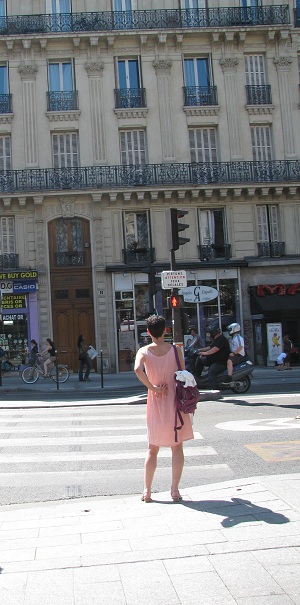 “You can help?” the taller of the two men said in French in a heavy foreign accent.
“You can help?” the taller of the two men said in French in a heavy foreign accent.
“Please?” said the woman.
It was a busy intersection, I didn’t see any reason to be worried, but I was aware that I had my own wallet in my jacket’s breast pocket and a stranger’s wallet in my front pants pocket. Since I was going to interview the head bartender at Shangri-La and test one of its restaurant I also had my camera in a jacket pocket and my notebook in one hand.
I approached the three strangers cautiously, one hand against the breast pocket of my jacket and the other, holding the notebook, on the front pocket of my pants, as though trying to protect my virtue.
I tried to keep a safe distance but they came in close.
The man who had asked for help said, “Someone take our car.”
“Someone stole your car?” We were at a busy intersection where there seemed no place to even park a car other than two delivery spots by the bus lane.
“Yes, steal our car. It was here”—the three of them pointed further along the boulevard—“and when we return it’s not here.”
The woman also spoke some French and would repeat or add to what the first man said, “Yes, steal our car… It was here and now not here.”
The other man nodded when she spoke but otherwise said nothing. He seemed to be sizing me up.
Romanian? Bulgarian? I guessed.
“You call the police for us?” said the first man.
The subject-verb question sounds like a command in English but it was softened here by three pairs of brown-eyed hope. They were serious.
“You call the police?” said the woman. She was quite pretty, tall with thin shoulders, curly black hair, sweet eyes, a kind, chiseled chin. She could have been an Eastern European rock star.
What kind of thief asks you to call the police?, I thought. Still, I discreetly had a hand on each wallet and knew that I would have to shift my defenses in order to take out my phone.
The woman must have sensed my unwillingness to do so because she took out her own phone and handed it to me. The man who spoke some French said something to the man who spoke none and the latter took out a document and held it in front of me. I didn’t take either the phone or the document in my hand.
The document he held in front of me was the ID paper for the car. It was a Renault, 2002. He pointed to the license plate number.
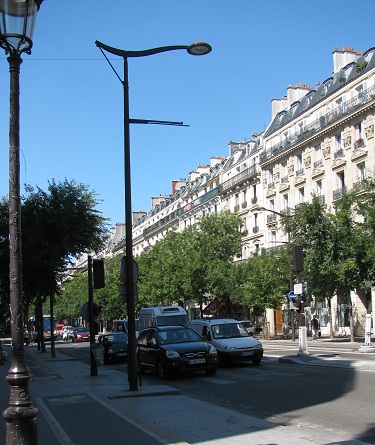 “Blue,” I understood him say in some language, perhaps mine.
“Blue,” I understood him say in some language, perhaps mine.
The man who spoke French said something else to him—it was apparently the latter’s car and he then showed me his driver license. He was from Kazakhstan. I don’t think I’d ever met Kazakhstanis.
“You call police?” said the woman. “Say someone steal our car.”
I can never remember if the number for the police in France is 17 or 18, the other being the fire department.
“Eighteen,” I told her. “One, eight.”
She dialed. I then took the phone in the hand that had been protecting my jacket pocket. It’s hard not to trust someone who’s asking you to call the police with her own cell phone. Still, they were crowding awfully close. One of them emitted a leathery lavender scent with a hint of vanilla. Or perhaps it was their collective scent that I smelled. I tried not to look awkward by pressing my wrist to my breast pocket and the phone to my ear.
Eighteen, it turns out, is the fire department. The fire department operator transferred me to the police, 17, one seven.
When the police department answered I told the male voice that I was with some foreigners who didn’t speak French who had just had their car stolen on Boulevard Magenta.
“It’s been towed,” he said wearily. “It’s at the pound.”
“How’s that?” I said. What I meant was how could he know which car I was talking about and where exactly it was now?
“It’s been impounded,” he repeated, apparently understanding the situation without me having to describe it.
“They say it was stolen.”
“Illegally parked,” he said. “I’ll give you the number of the Pantin pound.”
“Just a second.”
I signaled to my friends that I needed to write something down. I released my hand from the Italian’s wallet in my front pocket, handed my open notebook to the woman while taking out my pen to write down the number.
When I hung up I told the three Kazakhstanis that their car had been towed because illegally parked.
“Not stolen?” said the woman.
“Apparently.”
She translated for the man with the muscles who didn’t speak French. He pointed endearingly to the phone for me to call the pound.
I let the woman dial the number on her phone and asked her to hold it to my ear since I’d have to write down some information. I could have freed both hands by holding the phone against my shoulder but I felt still felt a need to protect some of my virtue.
The guy at the pound sounded as weary as the policeman. I told him that I was looking for a blue 2002 Renault and gave him the license plate number. He confirmed that it was at the Pantin pound and gave me the address, 15 rue de la Marseillaise in the 19th. He told me that the closest metro stop was Porte de Pantin. He also told me that they closed at 8:30.
I gave the Kazakhstanis the information and told them they would have to hurry.
I told them there was a direct line by metro from where we were and that they’d have to ask for directions when they got out. I tore out the page on which I’d written down the information.
“If we give address to taxi he will take us,” the woman said without bothering with the question mark.
“Yes,” I said. “About 15 minutes.”
“Thank you,” she said.
“Thank you,” said the other one who spoke French.
“Thank you,” said the one who’d had his car towed.
“No problem,” I said, cautiously feeling myself up so check that both of my wallets were there and that my camera was in my pocket and that I had my notebook and my pen.
“Thank you,” they all said.
I pointed in the direction they had to go.
I was sorry to see them go. I liked them. One of them – of the three of them collectively – smelled good. They had such hopeful eyes. I watched them cross the street. They seemed happy to be trying to get their car from the pound.
I felt a bit lonely. I thought, “Now there’s someone I’d like to get drunk and stupid and have an adventure with.” And then I remembered that I was going to do just that going to just that, with L., through a long evening of food and drink at the Shangri-La. I was looking forward to telling her about my adventures as the good Samaritan, even though in one of those adventures I could be considered a thief for having a stranger’s wallet in my pocket.

I ran down to the metro station. It was 8:15 by the time the next metro came, the time I was supposed to meet with L. at the Shangri-La, still about 25 minutes away. I could have sent a text message to say I was running late but chances are she was going to be at least 15 minutes late herself.
I found a corner seat in the subway car with no one beside me and took out the Italian’s wallet to examine the contents piece by piece. I saw again what he’d had for dinner last night and what he’d had at McDonald’s less than an hour ago. I saw the different names on the two credit cards. I looked at the card from the Italian government ministry and the dog-eared card from a bank saying to call a certain number if the accompanying credit card has been found.
I figured that the thing to do was to find someone at the hotel who spoke Italian to call the number on the card to say that I’d found the wallet, even though by then I would be across the city from where it was lost.
A text messages from L. arrive: “Ur late,” meaning that she’d just arrived, 15 minutes late herself. Three minutes later I received a second text message saying, “I feel like a whore standing outside of a luxury hotel wearing high heels.”
I responded to the second message: “5 min. Negotiate for 2.”
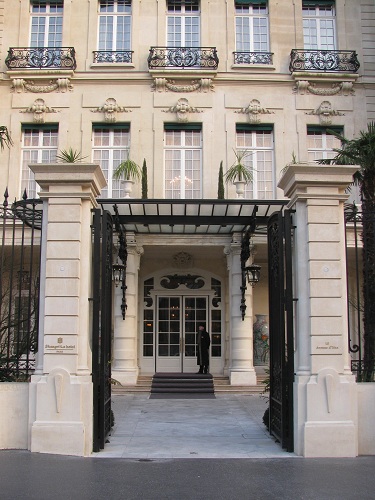 L. shook her head when she saw me coming, which drew attention to her décolleté.
L. shook her head when she saw me coming, which drew attention to her décolleté.
“You look beautiful,” I told her.
“I only look beautiful when you’re late.”
“That’s because you have a certain glow when you’re upset.”
She offered me her check with pretend reluctance.
“I have a good excuse,” I told her, “I’ve been helping strangers in distress.”
“That doesn’t help me,” she said.
Inside the hotel I asked the concierge for his help with the Italian. He confirmed that the card in the wallet said to call that number if the accompanying credit card was found.
He was nice enough to dial the number, to ask in Frenchified Italian if the person on the other end spoke French. But then handed me the phone.
It was quickly apparent that the man on the other end didn’t speak French. I tried English but that didn’t help. He said, “What can do?”
I said, “Yes, I want to know what you can.”
He repeated, “What can do?” perhaps an Italian version of C’est la vie.
My route to Shangri-La had been paved with good intentions, but now L. was looking at me with an air of “I got dressed in my décolleté best so that you could wander what to do with an Italian’s wallet?”
I hung up and decided to end the matter there for the evening. I would take the wallet to the polic station in the morning.
L. told me that I owed her a drink. Fifty euros would about cover it. I resisted having an Italian pay for it.
© 2011, Gary Lee Kraut
A review of the bar and restaurant La Bauhinia at the Shangri-La tested that evening can be found here.
A review of the Shangri-La Hotel can be found here.
More “In Transit” vignettes can be found here and here.
Comments may be left below.


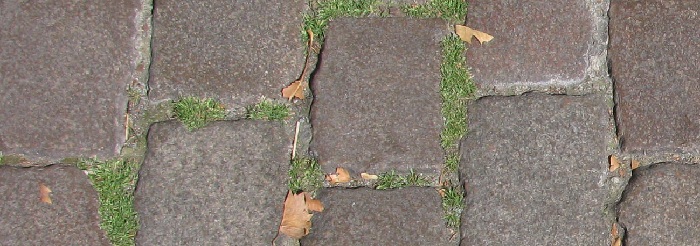
Reminds me of when found a wallet once in London I spent an afternoon trying to figure out what to do with it before turning it into the police.
I appreciate your unique brand of travel writing.
Best,
Jackie